Rapporti ISTISAN 09/49 ISTITUTO SUPERIORE DI SANITÀ Ageing ...
Rapporti ISTISAN 09/49 ISTITUTO SUPERIORE DI SANITÀ Ageing ...
Rapporti ISTISAN 09/49 ISTITUTO SUPERIORE DI SANITÀ Ageing ...
Create successful ePaper yourself
Turn your PDF publications into a flip-book with our unique Google optimized e-Paper software.
<strong>Rapporti</strong> <strong>ISTISAN</strong> <strong>09</strong>/<strong>49</strong><br />
2.8. Lifespan psychology<br />
The Lifespan Psychology model considers the ontogenetic development along the whole life<br />
span, like Erikson’s model. The development to which we refer is multidirectional,<br />
multidimensional and multifunctional. It is a model having a strong evolution and a context<br />
related mark (Baltes & Baltes, 1990). The idea of development suggested by this approach is<br />
defined within interaction processes between biological and cultural factors, underlining the<br />
necessity of a multidisciplinary approach. The development comes from the action of three<br />
systems, in relation to age: normative, historical and non-normative influences. Development<br />
processes are interactive and dialectic and assign an active role to the individual. The passage<br />
from adult age to old age is not examined in relation to the passing of years, but in relation to<br />
events. The result of ageing development depends on personal and social factors which take into<br />
account the simultaneous presence of losses and gains. Resources are used according to the<br />
needs of the development stage. If in the child energies are directed towards growth, energies in<br />
the elderly are oriented towards the preservation of the state of health. The basic approach of<br />
Lifespan Psychology is also used within the SOC (Selection, Optimisation and Compensation)<br />
models.<br />
2.8.1. SOC Model<br />
Paul and Margaret Baltes have set up a meta-theoretical model, which tries to explain<br />
optimal ageing as the result of the action of two processes: the maximisation of gains and the<br />
minimisation of losses (Baltes, 1997). It is a universal and relativistic model at the same time.<br />
Among the modern theories of development and ageing, the model of Paul Baltes (Baltes, 1987;<br />
Baltes, 1997) well represents the perspective of the life cycle (life-span) and the new conception<br />
of positive ageing. The SOC model offers new starting points for intervening in the elderly’s<br />
life, in it an active selection is made by the individual himself as regards the loss of resources<br />
and of the necessary means to reach the result. In case of losses it is possible to use different<br />
strategies or to reduce the objectives of the performance (compensation).<br />
We can briefly summarise the model suggested by Baltes, by saying that he affirms that by<br />
adopting a positive perspective on ageing, this stage can be mastered by the individual and can<br />
give the elderly new abilities and skills, also greatly increasing the quality of their life. Such<br />
model is called SOC, which emphasises the processes implied in the improvement of the life<br />
quality of the elderly: selection (a pianist can select, by reducing it, the repertoire of pieces he<br />
can play), optimisation (he must practice more), compensation (he must adopt new strategies,<br />
such as playing the pieces more slowly, in order to give the sense of speed, even if his fingers<br />
have lost their speed). The positive culture of ageing suggested by Baltes, starts from the idea<br />
that ageing is a complex and varied process which, implying different aspects, cannot be faced<br />
in a linear and homogenous perspective. From this point of view, in the ageing stage both<br />
dimensions inclined to improvement and dimensions clearly oriented to decline are<br />
interconnected. According to Baltes in conditions of loss and/or limitation a person learns new<br />
strategies of progress and acquires new abilities to cope with losses. Such idea can also be<br />
traced back to the psycho-analytical tradition of social origin and particularly to the Individual<br />
Psychology by Adler. A good ageing process is based on the emotional and cognitive mastery<br />
of one’s own physical decline, which leads to a correct exam of reality and not to the refusal or<br />
the negation of the decline itself. Baltes distinguishes seven key formulas which represent the<br />
positive culture of ageing. The seven formulas by Baltes are:<br />
1. The course of ageing is heterogeneous.<br />
16



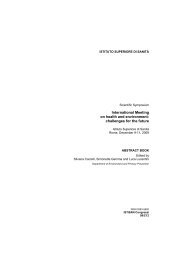
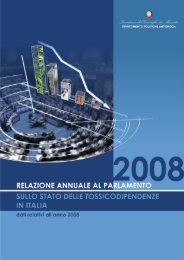
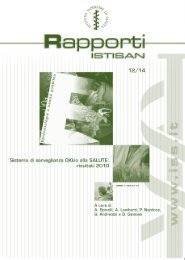
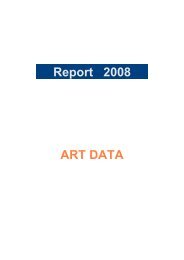
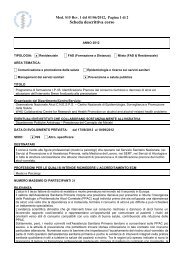
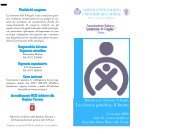
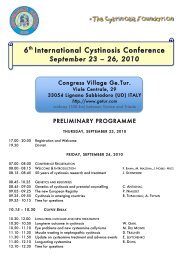
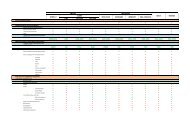
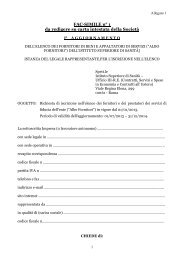
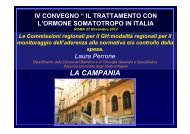
![Emilia Romagna [PDF - 175.10 kbytes]](https://img.yumpu.com/23556597/1/184x260/emilia-romagna-pdf-17510-kbytes.jpg?quality=85)
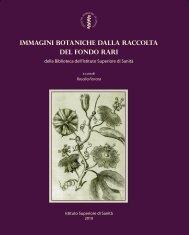
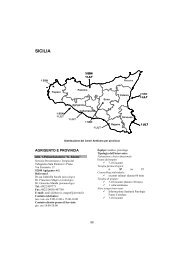

![Istisan Congressi N. 66 (Pag. 1 - 81). [PDF - 2021.12 kbytes] - Istituto ...](https://img.yumpu.com/23556493/1/171x260/istisan-congressi-n-66-pag-1-81-pdf-202112-kbytes-istituto-.jpg?quality=85)